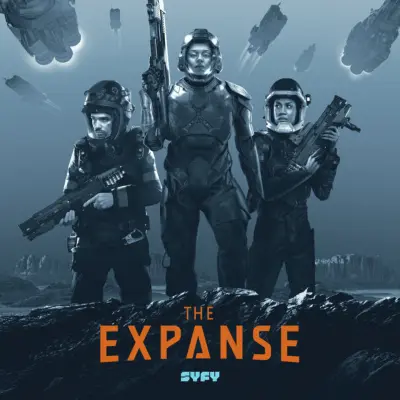Amazon's The Expanse returns to its strengths in Season 5
-

"The Expanse’s greatest strength is also the source of its biggest weakness," says Zack Handlen. "In adapting a series of novels to television, the show’s writers have a tremendous amount of material to draw from, including character histories, a fleshed-out universe, and a narrative arc they can tweak and reshape as they see fit. But each individual novel rarely fits within the confines of a single season of television, and books don’t have the same demands as television shows; characters can disappear for long periods of time without authors having to worry about actor contracts or audience investment. In its fourth season, The Expanse focused on Cibola Burn, the fourth novel in the series. Since that book’s plot stuck to a limited number of locations and a smaller cast, the show added in scenes and subplots following other characters who would be important for later entries. It made for a good season overall, but one that still felt essentially diluted. Fortunately, the show’s fifth season does not suffer from a similar concern. Once again, the writers are focused on a single novel—here, it’s Nemesis Games. But thanks to some setup in season four and the scope of Games’s plot, every storyline feels like an equally important piece of the whole. This is critical, because the season also takes the risky move of separating its core ensemble for the bulk of its episodes. The chemistry and interplay among the crew of the Rocinante has always been a major draw, and here, it’s more or less a moot point, with each one stranded from the rest, isolated in part by the massive crisis that serves as the season’s main threat. The fact that this works as well as it does is both a testament to the quality of the source material, and proof positive of how much time the show has put in making sure all of its core cast is worth watching."
ALSO:
- Season 5 feels like an entirely different show from Season 4: "What sets this season of The Expanse apart is the sheer number of storylines and separate quests that are happening for the crew of the Rocinante as well as their allies and/or enemies elsewhere," says Kaila Hale-Stern. "In this way, it feels like an entirely different show than season 4, which saw the Rocinante’s Holden (Steven Strait), Naomi (Dominique Tipper), Amos (Wes Chatham), and Alex (Cas Anvar) all together on a distant planet, facing a mysterious alien threat. Like the seasons before, that was much more of an ensemble piece. A guiding motif of The Expanse from the start has been family, and what it means to forge your own—but in season 5, the family is split up."
- The Expanse is second to none when it comes to portraying the day-to-day reality of a universe where interplanetary travel is a given: "The show’s move to Amazon meant a chance to fully embrace both the magnitude of these remote tech-heavy environments and the logistical ecosystems involved in sustaining them," says Steve Greene. "Even with the protomolecule saga relatively sidelined this season, The Expanse draws so much strength from exposing how fragile an expansive society like this is. The further out you extend, the more vulnerable you are to something sneaking right under your nose. One tiny crack in that system can be devastating. Anything more than that can be catastrophic."
- Comparing The Expanse vs. Battlestar Galactica: "Galactica had a more drastic premise — a handful of surviving humans chased around the galaxy by exterminating cyborgs — but the post-Sept. 11, mid-climate-crisis associations with terrorist violence and existential dread are the same," says Mike Hale. "The 9/11 connection becomes even stronger, if anything, in the new season of The Expanse, where a series of undetectable asteroids aimed at earth by an off-world zealot suggest the hijacked airplanes bearing down on New York and Washington. The Expanse operates on a smaller, more intimate scale than Galactica, though, which is both a large part of its charm and a reason that it isn’t, at the end of the day, as viscerally exciting as its predecessor."
- How the Season 5 premiere's shower scene came together with the "power of editing"
- The Expanse producers learned about the sixth and final season renewal while completing Season 5
TOPICS: The Expanse, Prime Video
More The Expanse on Primetimer:- The "Evil Russian" stereotype has persisted on shows like Devs, despite "humanizing" Russian portrayals on The Americans and Chernobyl
- The Expanse's final season was a projection of our times 300 years into the future
- The Expanse always intended the final season to be one big war story
- The Expanse boss on the series finale: "It's a natural place and a natural ending in many ways"
